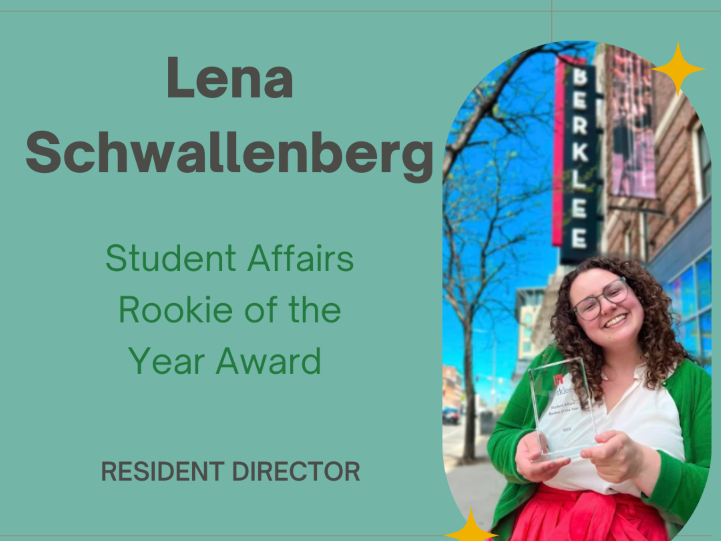
NPGS Recognition #NASPAInTheNow
Supporting the Profession New Professionals and Graduate Students Graduate New Professional
July 12, 2022
What award were you recognized with recently?
Student Affairs Rookie of the Year Award
This award recognizes a new employee who has been with the Division of Student Affairs for less than 2 years. They are a new employee who exceeded all expectations and set a benchmark for future hires with their great work, can-do attitude, and their genuine approach to embracing the Berklee community.
Why higher education? What drove you to choose the field as your career?
It was actually a last-minute pivot from a pre-existing post-grad plan. I was set to attend a master's program focused on storytelling when a sudden life change caused me to reconsider, and I was lucky enough to have wonderful mentors at my alma mater who helped me secure a last-minute spot in UF's higher education program and an assistantship in housing. I ended up sticking with it because of the joy the work brought me -- both interpersonally in supervising and managing staff, and administratively with the projects I was pursuing. I recently found a vision-setting worksheet I completed in undergrad, and I had answered the question "where do you want to be in 5 years?" with some combination of "living in a major city, working somewhere I'm valued, prioritizing my personhood outside of my career, and pursuing life with the person I love." My 20-year-old self dreamed of this, and while I suppose I need a new goal now, I'm deeply fulfilled in my work -- this work that saves lives, sparks change, and inspires the future.
What is one piece of advice that you have for current grad students and/or new professionals?
I received an absolutely stellar piece of advice from my Director of Housing when I was entering my first full-time search, and it was to consider three key points of a triangle when weighing a job offer: the work you'll be doing, the support system you'll have nearby, and the lifestyle you'll have access to in that area.
The questions I asked myself for each during my search:
Work -- Is the work meaningful? Do you enjoy it? Do the institutional/departmental values and goals align with your own? Are your contributions valued? Is it going to provide you enough challenge to help you grow, but also enough support that you don't sink?
Support System -- Are you near people who fill your cup? While our on-campus connections can be impactful, what is your broader community outside of colleagues? The nature of our field requires us to move frequently, so what network can you create within the city or region you're in? Is it important to be close to family? A partner?
Lifestyle -- What kind of life do you want to live outside of work? Is it important for you to be geographically-bound to a particular region? What are the things you need access to -- environmentally (parks, ocean, no snow, etc.), recreationally (sports, theater, entertainment, etc.), and personally (re: my colleague who must be within a certain mile radius from a Target to feel spiritually fulfilled).
You'll need at least two of these three points to combat burnout and dissatisfaction, but an ideal job will give you all three (shoutout to Berklee!).
What does recognition mean to you? Why is it important to those in our field?
Recognition is an opportunity for celebration and gratitude, but it can also be a powerful tool against historical norms in education -- and other fields -- that have expected women, people of color, and others with marginalized identities to carry heavier loads without equitable acknowledgement. True recognition in our field amplifies contribution and expands opportunity, putting your work in front of those who may not traditionally see it, or attributing efforts that have uplifted the collective. In short, and to reference my favorite theory (thanks, Schlossberg!) recognition - paired with action - helps us to decrease marginality and increase mattering.
Author: Lena Schwallenberg (she/her/hers) works as a Resident Director at Berklee College of Music. As a Double Gator, Lena earned her bachelor’s in Journalism and her master’s in Higher Education from the University of Florida. In her free time, Lena loves writing, giving tours of Boston, and creating elaborate murder mysteries from scratch with her partner. You can follow her on Instagram at @lenaschwallenberg.